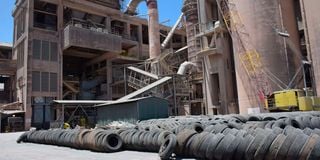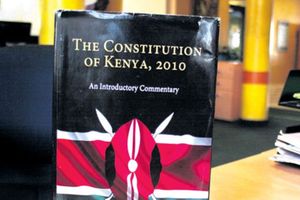
The Bamburi Cement Factory in Mombasa.
About 4,000 small and dispersed shareholders of Bamburi Cement are on tenterhooks as the bidding war for the largest and most profitable cement company approaches D-Day.
The questions top on their minds: What is the likelihood that the Tanzanian entity, Amson Group, which has placed an offer of Sh23 billion, will improve its offer? Is there a possibility that the Tanzanians could opt to drop out of the bidding altogether by invoking obstructive tactics to frustrate the completion of the takeover process?
Managed and regulated well, mergers and acquisitions make sense to small and dispersed shareholders because they present them with an opportunity to unlock value from the shares they have been holding.
The Tanzanian company is one of the richest family-owned conglomerates in Eastern Africa with investments in Tanzania, Mozambique, Malawi, Burundi and Democratic Republic of Congo. It is involved in wide ranging commercial operations and investments including importation of bulk oil and ownership of two cement plants in Tanzania, including Mbeya Cement that it recently acquired from Swiss construction form Holcim Group.
The Tanzanians are pitted against Savannah Clinker owned by Mr Benson Seda Ndeta, the chairman of the financially troubled Savannah Cement Company, which is currently under liquidation by Absa Bank. Mr Ndeta has confounded markets by mounting an audacious competing offer of Sh27 billion for Bamburi Cement. He says his company is currently in the process of developing a limestone extraction and clinker making plant in Kitui.
Sh27 billion
Last week, in response to a recent article in this column, he wrote to me saying: ‘“I know there is an ugly sponsored attack on my bid and my financier, I ask you please to go through the filings of GIFDA at the US Security Exchange (SEC) to realise how misplaced the campaign against my offer is.”
Who is GIFDA? This is the American entity Mr Ndeta and his transaction advisors have presented as the financier who will fork out the Sh27 billion to pay the shareholders of Bamburi Cement.
As advised by Mr Ndeta, I painstakingly read through the rather voluminous documents filed by GIFDA and one of its associates—Ameri-Metro Inc.—on the SEC and this is what I found. The truth of the matter is that the documents filed by GIFDA on the SEC do not provide definitive proof that funds have been secured. Yes, I have seen a private placement memorandum where GIFDA announces plans to raise a whopping $40 billion from the market in multiple tranches. It is just but a plan.
There is a document called a master trust indenture that basically describes the legal framework for bond issuance. But you do not see evidence that investors have already committed funds. An investor presentation has also been filed by GIFDA. But it all amounts to a marketing tool to attract potential investors
There is an executive summary with details on the joint ventures and private-public partnership deals planned with big-sounding names of asset and investment bankers.
I must confess that my findings of the review of the filings by GIFDA gave me insights on the games parties play and what listing documents actually mean. Merely listing documents on the SEC does not mean you have the funds. The SEC allows you to list pre-revenue and non-operational companies. In simpler language, you are allowed to list a shell company.
This shell company, you proceed to declare that it plans to raise money from investors through pre-revenue bonds, which you can proceed to use to acquire specific assets or undertake a project like say building a light rail in Arkansas.
Where is the catch? The said assets may not exist. The said projects may not have been awarded to the issuer of those bonds. You may have not undertaken a single infrastructure project in 10 years
As you go through the filings, you will come across several companies and special purpose vehicles that have issued nonrevenue and non-operation bonds. The SEC merely facilitates transparency and disclosure to potential investors. It does not express an opinion on the veracity of the claims on the private placement memoranda.
You will also find that almost all bonds listed by GIFDA are only for private placement sale that come with disclaimers and caution by the regulator. In the rare cases where some bonds have been sold, I have seen lawsuits and a judgement by a court in Delaware against the central player in these transactions—Mathias Shah—that revealing the games and activities of the nexus of shell companies and special purpose vehicles in these transactions in very unflattering words.
What are the big policy issues? We will need to review Capital Market Takeover Regulations to tighten the requirement of proof of funds by potential acquirers in all takeover transactions involving listed companies.













